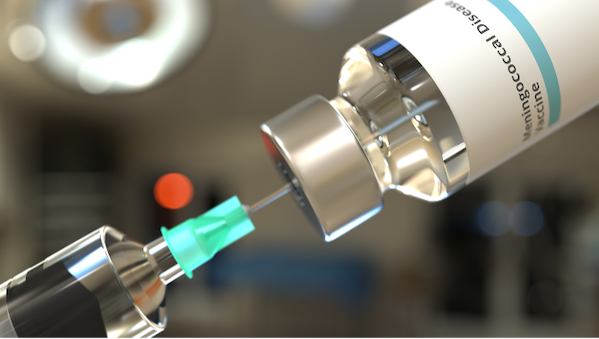GSK’s Five-in-One Meningococcal Vaccine Under Review by the FDA
April 20, 2024
Source: drugdu
 353
353
Don Tracy, Associate Editor
With a final decision expected next February, MenABCWY combines the protective elements of GSK’s existing vaccines to target the five primary serogroups of Neisseria meningitidis.
 GSK announced that the FDA has accepted for review an application for its five-in-one meningococcal vaccine MenABCWY. MenABCWY is a combination of GSK’s two existing vaccines, Bexsero and Menveo, and targets the five primary serogroups (A, B, C, W, and Y) of Neisseria meningitidis. These serogroups are credited with causing the majority of meningococcal disease (IMD) cases around the world. According to the company, a final decision is expected on February 14, 2025.1
GSK announced that the FDA has accepted for review an application for its five-in-one meningococcal vaccine MenABCWY. MenABCWY is a combination of GSK’s two existing vaccines, Bexsero and Menveo, and targets the five primary serogroups (A, B, C, W, and Y) of Neisseria meningitidis. These serogroups are credited with causing the majority of meningococcal disease (IMD) cases around the world. According to the company, a final decision is expected on February 14, 2025.1
“In the Phase III trial (NCT04502693), all primary endpoints were achieved for the MenABCWY vaccine candidate, including immunological non-inferiority to one dose of GSK's Meningococcal Groups A,C,Y and W Vaccine, and non-inferior immune responses against 110 diverse MenB invasive strains (representing 95% of MenB strains circulating in the US) as compared to two doses of GSK’s Meningococcal Group B Vaccine. The vaccine was well tolerated with a safety profile consistent with both vaccines,” reports GSK, in a press release.
In May 2023, GSK first announced promising results from a Phase III trial evaluating the effectiveness and safety of MenABCWY. The company stated that overall, the vaccine was well tolerated in comparison to two doses of Bexsero and one dose of Menveo in patients aged 10-25 years, with a further display on non-inferiority. An addendum to the Phase III trial also found effectiveness among 110 meningococcal serogroup B (MenB) invasive strains.2
“These preliminary data further unlock the potential of our MenABCWY vaccine candidate in providing protection against invasive meningococcal disease caused by serogroups A, B, C, W and Y. It’s particularly encouraging to see the breadth of coverage against the broadest panel of circulating MenB strains to date, as we know MenB is the most common cause of meningococcal disease in the US with the lowest immunization rate,” said Tony Wood, chief scientific officer, GSK, in a press release.
According to data from the Centers for Disease Control and Prevention (CDC), rates of meningococcal disease have decreased significantly since the 1990s. Typically, it is most common in infants, and second most common once a child reaches adolescence. Further, an estimated 10 to 15 out of every 100 people with the disease will die from it. Out of those who survive, one in five are likely to have long-term disabilities, such as deafness, brain damage, and issues with the nervous system.3
“Clinicians should consider complement testing in patients with meningococcal disease,” reports the CDC. “Meningococcal disease is often the first sign that a person has complement deficiency, which is a hereditary condition. In addition, recurrent disease may occur for patients with complement deficiency. Clinicians should offer vaccination to those patients found to have a complement deficiency.”
Patients with functional or anatomic asplenia, HIV, and complement component deficiencies such as factor H and factor D have an additional risk for obtaining meningococcal disease. The CDC highly recommends vaccination for all preteens and teens, as well as adults and children with an amplified risk.3
“Meningococcal vaccination can help save lives and these results are significant in moving one step closer to protection against five meningococcal serogroups with a single vaccine,” said Terry Nolan, principal investigator for the Phase III trial, head, vaccine and immunization research group, Peter Doherty Institute for infection and immunity, the University of Melbourne, and Murdoch Children’s Research Institute, in a press release. “The potential for a simplified immunization schedule could improve accessibility for the target population susceptible to meningococcal disease.”
Read more on
- Gusekirumab Injection Accepted by CDE, Multiple Pipelines Advancing Simultaneously March 4, 2026
- Yifan Pharmaceutical’s teriparatide injection has been accepted by the CDE (Center for Drug Evaluation), adding a new domestic player to the osteoporosis treatment field March 4, 2026
- //news.yaozh.com/archive/47318.html PD-1 sales surge March 4, 2026
- A major breakthrough! Roche’s oral BTK inhibitor achieves its third Phase III clinical trial victory, a game-changer in the multi-billion dollar MS (manufactured pharmaceuticals) market. March 4, 2026
- GB19 Injection Approved for Clinical Trials of Cutaneous Lupus Erythematosus March 4, 2026
your submission has already been received.
OK
Subscribe
Please enter a valid Email address!
Submit
The most relevant industry news & insight will be sent to you every two weeks.



